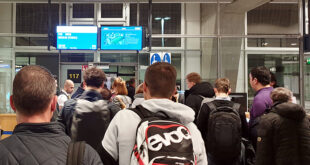- An online expert warns of a surge in holiday accommodation scams, noting a 28% rise in bookings and highlighting August as the peak month for bookings
- Common scams include fake listings, phishing attempts, fake reviews, payment fraud, and bait-and-switch tactics
- To protect yourself, verify accommodations by checking reviews and ratings while being cautious of overly positive or negative feedback, with extra vigilance needed for bookings in Germany, which had the sixth highest number of EU bookings last August
An expert has issued a warning about a significant rise in holiday accommodation scams this August, following data that shows it was the peak booking month last year.
This alert from QR Code Generator is based on a recent report revealing that travellers spent a staggering 123.7 million nights in accommodations booked through platforms like Airbnb, Booking.com, Expedia Group, and TripAdvisor during the first quarter of this year.
This represents a 28.3% jump compared to the same time last year – and it’s likely that scammers will increase their activity to capitalise on this rise in demand.
The public needs to be particularly cautious if booking accommodation for a European getaway this month, as the report also found August saw the highest number of bookings in 2023 – making it a prime month for scams this year.
Some destinations attracted more accommodation bookings than others last year, so holidaymakers attending the most popular countries should be extra vigilant when booking their accommodation, due to the increased scam risk.
European destinations most at risk of accommodation scams
| Destination | Number of Holiday Accommodation Bookings in August 2023 | |
| 1 | France | 2,110,398 |
| 2 | Italy | 1,352,488 |
| 3 | Spain | 1,285,103 |
| 4 | Greece | 626,934 |
| 5 | Croatia | 610,359 |
| 6 | Germany | 553,778 |
| 7 | Poland | 548,901 |
| 8 | Portugal | 400,167 |
| 9 | Austria | 191,394 |
| 10 | Romania | 158,711 |
Marc Porcar, CEO of QR Code Generator warns “As interest in holiday accommodation from sites like Airbnb and booking.com is much higher than it was last year, many will be looking to capitalise on this rise in demand – including scammers.
“The reality is that many of us assume holiday let listings are authentic when they appear on sites that we’re familiar with, and then place a booking without doing our due diligence and checking for warning signs. This is especially true if the property is listed as having limited availability or if there’s a short-term discount.”
Some of the most common scams that people may fall victim to include:
- Fake Listings – Scammers create fake accommodation listings to trick people into paying for non-existent properties
- Phishing Scams – Fraudulent emails or messages mimic legitimate booking sites to steal personal or financial information
- Fake Reviews – Fraudulent reviews are posted to artificially inflate the reputation of a scam property or damage the reputation of legitimate ones
- Payment Fraud – Scammers request payment through insecure methods, such as wire transfers or prepaid gift cards, rather than secure booking platforms
- Bait-and-Switch – After booking, the scammer provides a different, often inferior, property than what was advertised
Marc continues: “To avoid being scammed via fake listings, make sure you verify the accommodation you’re looking at by checking reviews and ratings. Even go so far as to look the property up on Google Maps, as we’ve seen instances of the listed property not existing at all. Remember if things seem too good to be true, they likely are.
“To protect yourself from phishing scams, hover over links to check the actual URL before clicking. Be cautious of URLs that are misspelled or closely mimic legitimate sites. Secondly, avoid clicking on suspicious links or downloading attachments from unknown or unexpected sources. Instead, go directly to websites by typing the URL into your browser.
“Lastly, be skeptical of unsolicited emails. Treat unexpected messages, especially those asking for personal or financial information, with caution, and always verify the sender’s legitimacy before taking any action
“To avoid falling victim to fake review scams, prioritise verified reviews from buyers or guests, as many platforms label these to show the reviewer has actually used the service or product. Secondly, be cautious of reviews that are excessively positive or negative, as a sudden influx of similarly worded reviews may suggest manipulation.
“Additionally, examine reviewer profiles for authenticity; profiles with limited activity or generic names could be fake. When making a booking, use secure payment methods such as credit cards or reputable payment platforms. Also, verify that the payment site is secure by checking for ‘https’ in the URL and a padlock icon in the address bar.
“Verify details to ensure the property or service matches the description and images provided. If possible, contact the company directly to confirm the details. Additionally, compare the deal you’re offered with similar listings to spot any discrepancies or unusually low prices that might indicate a bait-and-switch scam.”
——–
This press release was prepared by QR Code Generator (https://qrfy.com), a leading expert in QR code technology.
 THE AFRICAN COURIER. Reporting Africa and its Diaspora! The African Courier is an international magazine published in Germany to report on Africa and the Diaspora African experience. The first issue of the bimonthly magazine appeared on the newsstands on 15 February 1998. The African Courier is a communication forum for European-African political, economic and cultural exchanges, and a voice for Africa in Europe.
THE AFRICAN COURIER. Reporting Africa and its Diaspora! The African Courier is an international magazine published in Germany to report on Africa and the Diaspora African experience. The first issue of the bimonthly magazine appeared on the newsstands on 15 February 1998. The African Courier is a communication forum for European-African political, economic and cultural exchanges, and a voice for Africa in Europe.





























